

Newton's third law holds that every action has an equal and opposite reaction. This takes the form of zero-sum games all around us, from a seesaw in a playground, to a rocket breathing its fiery breath down to earth, propelling it up into space. These ubiquitous zero-sum games keep systems in balance, but this sometimes makes change difficult.
Like me, you may have made a new year's resolution, and perhaps, like me, you want to make a positive change to your health. But we know old habits die hard, and heading into month two, perhaps you're starting to feel the temptation to revert to the mean, perhaps you've already fallen off the wagon.
This year I'm taking a non-zero-sum approach that I'd like to share with you, which might help us stick to our goals (as usual, I am unqualified to offer advice on this week's topic—heed it at your peril).
Every self-improvement journey starts with a why or in my case a few of them. I'm 43 and starting to have to think about staying in shape. Recent blood-tests detected slightly high cholesterol, low protein—nothing earth-shattering but I also have a family history of type 2 diabetes, which is a pre-cursor to dementia and Alzheimer's which also run in my family.
I'm also a keen rock-climber, and got pretty fit early last year.
But a shoulder injury last year (unrelated to training) and not focusing on any sort of exercise or diet, has left me uuuuuunfit. I've been struggling to do 5 chin-ups (certainly not a muscle-up) and have returned to a plateau of about a V4 level climber (for context, a teenager could probably climb at this level given about a month of practice, if not immediately).
I've also never been at an ideal weight and strength (I've been either skinny and weak or strong and slightly over-weight). This year, things are going to be different, why? Well, first, I have enough...
WHYS
- Improve blood test results: reducing the risk of diabetes & dementia.
- Improve rock-climbing: V6 level—I've never successfully climbed V6, which requires getting lighter and stronger
- Get in proper shape for once: a bonus result getting lighter and stronger
I encourage you to list your whys—a particularly strong one can be more effective than a list.
As well as having strong motivating reasons, I've also researched and tried various approaches over the past 5-10 years; fasting, no-sugar, bulking and shredding, strict calorie counting, volumetric weight training and many other approaches, which have taught me what works, and revealed where the results are zero-sum.
Just like nature, we are self-balancing beings; exercise will-power in one area of your life and you'll find yourself cutting a corner in another, go for a jog—treat yourself with a snickers, do a long run—take a 2 week break. Then there's over-training, where we want to get it all over in one go, leading to injury. But, it's more than psychological, your body has physiological processes that tend toward homeostasis. Kurzgesagt explains about how your body cheats you of your fitness efforts when consistent exercise increases your energy efficiency, meaning you burn barely any more calories than you do when inactive (more on this later, it's not that simple). Also, if you diet too fast your body will compensate by retaining calories! Then you have the processes of muscle-building and weight-loss working against each other because, as the ever irreverent Dr Mike Israetel explains, catabolism (the breaking down of nutrients such as fats) and anabolism (the building of tissue such as muscle) don't operate well simultaneously.
As a professional body-builder Dr. Mike suggests alternating between massing and fat-loss phases to avoid these processes cancelling out.
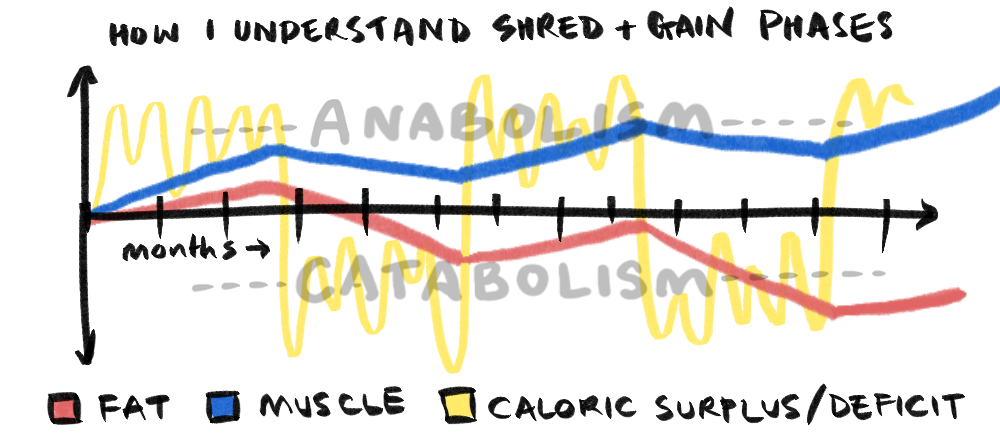
"If you think your best efforts are spent in recomping or lean gaining and you never pay attention to intentional massing or fat-loss phases you're not getting the most bang for your buck"
—Dr. Mike Israetel
I love a good motivational video, but there are diminishing returns on motivation, and it's not just that you get used to it, it's that your brain is self-balancing, so if you artificially drive up motivation, you're going to get a corresponding decrease in baseline motivation. Interestingly too, your dopamine system and your adrenaline system work differently. If you spike adrenaline, it will spike dopamine, but adrenaline spikes make you more sensitive to adrenaline, whereas dopamine spikes make you less sensitive to dopamine. So, if you're hyping yourself up with adrenaline you'll end up with a baseline of high stress and low motivation.
So, let's see what zero-sum games we're up against.
ZERO-SUM GAMES
- Will-power: requiring will-power to drive your project is destined to lead to erosion of discipline in other areas.
- Exercising for weight loss: results in increased appetite, and ends up becoming more efficient, so the less you burn for every unit of exercise.
- Losing weight too fast: can lead your body to have a starvation response, lowering metabolism and energy.
- Anabolism vs catabolism: if you are trying gain muscle, you need a calorie surplus, but if you want to lose weight you need a calorie deficit... difficult to do both at once.
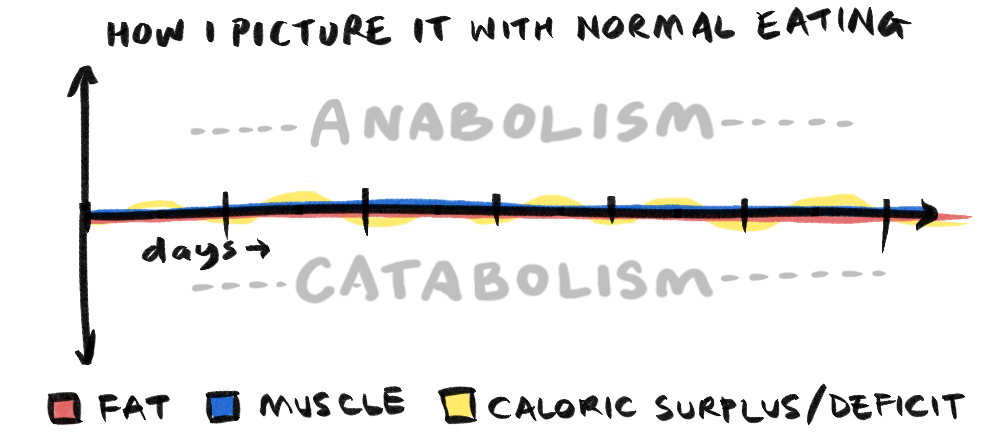
- Yo-yo dieting: while a professional body-builder might benefit from going through a bulk-shred cycle, for a lay person like myself this feels like focus followed by relaxation which ends up cancelling (and likely falling off the wagon). It also means that most of the time, you're not in peak condition.
- Hyping motivation: our dopaminergic system is self-balancing, so artificially trying to drive up motivation can lead to high stress and low baseline motivation.

NEGATIVE-SUM GAMES
There are also negative-sum games that amplify negative results.
- Sugar (my particular vice): adds calories without protein, generating fat and cravings, and reducing the perceived flavour of healthy foods.
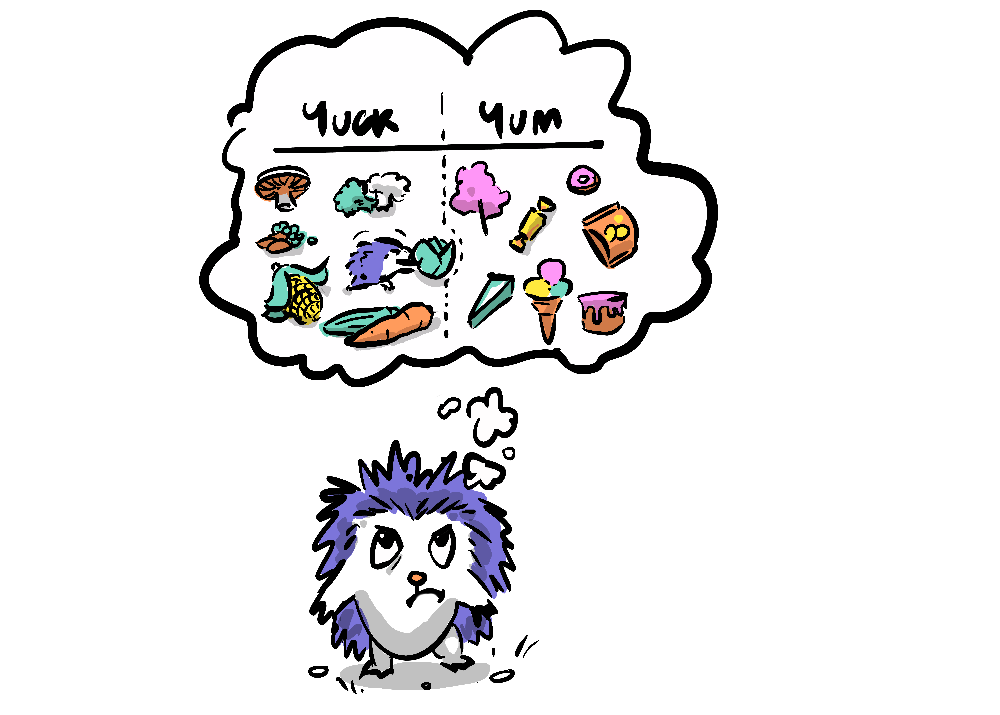
- Not getting enough sleep: reduces repair, growth and will-power and increases cravings.
- Not getting enough water increases hunger, reduces concentration.
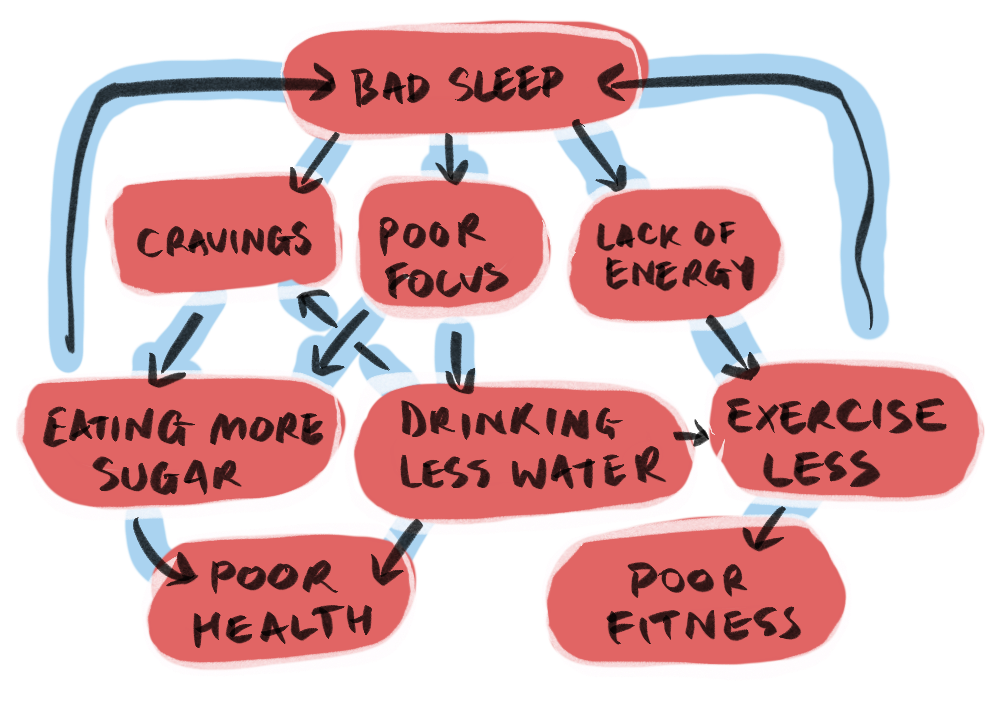
Also, simplicity is paramount, I've tried meticulous and exercise-tracking, which has worked but is not sustainable during busy periods. However, going through these periods helped me design simple meals that fit within desired macros.
Each week I make up a large tray of seasonal roast vegetables with a couple of apples and a can of cherry tomatoes to make the mix really tasty. I then store them in the fridge as a nutritious source of slow-burning carbohydrates throughout the week.
I don't eat much meat, so I get 150g/day protein from egg white (whole eggs will increase cholesterol), whey protein, as well as a variety of plant-based proteins, greek yoghurt (which is great for mixing with sweet or savoury foods), and beans. On occasion I have salmon, as a protein source which adds variety and taste to my daily veggies. I take 5g creatine, which is (noticeably) effective for muscle retention and growth and, after much research, safe. We have a normal, balanced dinner.
While Dr. Mike warns against trying to lose weight and gain muscle at the same time (recomping) because the processes of anabolism (building muscle) and catabolism (burning fat) conflict with each other, he does caveat that this is not so much of a problem if you're out of shape or new to working out.
"In a few circumstances ... you're not used to much or any of diet or training structure, okay you're a noob, or you make your diet and training structure much more intelligent ... you're finally eating enough protein stuff like that ... you absolutely can gain muscle and lose fat at the same time."
I'm also addressing the zero-sum trade-off between anabolism and catabolism by fasting for ~16 hours each day (~7pm to ~11am). I'm not super strict, my basic rule is "Feel hungry some of the day. Feel full some of the day". This way I'm cycling between anabolism and catabolism. Hopefully Dr. Israetel would approve.
Sugar is a negative-sum game, the more you have the more you want, it affects sleep, it makes you crash, it's bad for your skin, and has terrible long term effects (as mentioned; type 2 diabetes, dementia etc). But it tastes soooo good.
I'm a sugar addict, but I know from experience that if I cut sugar from my diet entirely (no products above 5% sugar, and sticking to berries if I want fruit) I stop having cravings after about 3-4 days. It also makes other (lower-calorie) foods tastier (your tastebuds literally get replaced with new, more sensitive, taste buds in a couple of weeks). So, without having to count calories, you naturally don't eat as many.
This is where you focus on individual muscles giving them a large amount of volume or time under tension without recruiting other muscles. Bad technique leads to sharing the load across muscles so you're not pushing any one particular muscle as far as it can go, and it is in those periods of peak stimulus (using good technique) that muscle growth is optimised. This is in itself a way of harnessing non-zero-sum gains because the growth is disproportionate to the effort put in.
So, there we have it, let's look at the non-zero-sum games that we're replacing the zero-sum games with.
NON-ZERO-SUM GAMES
The Basics
- Prioritise sleep: helps to keep focused, reduces cravings, builds tissue
- Hydration: aids focus and will-power, reduces cravings
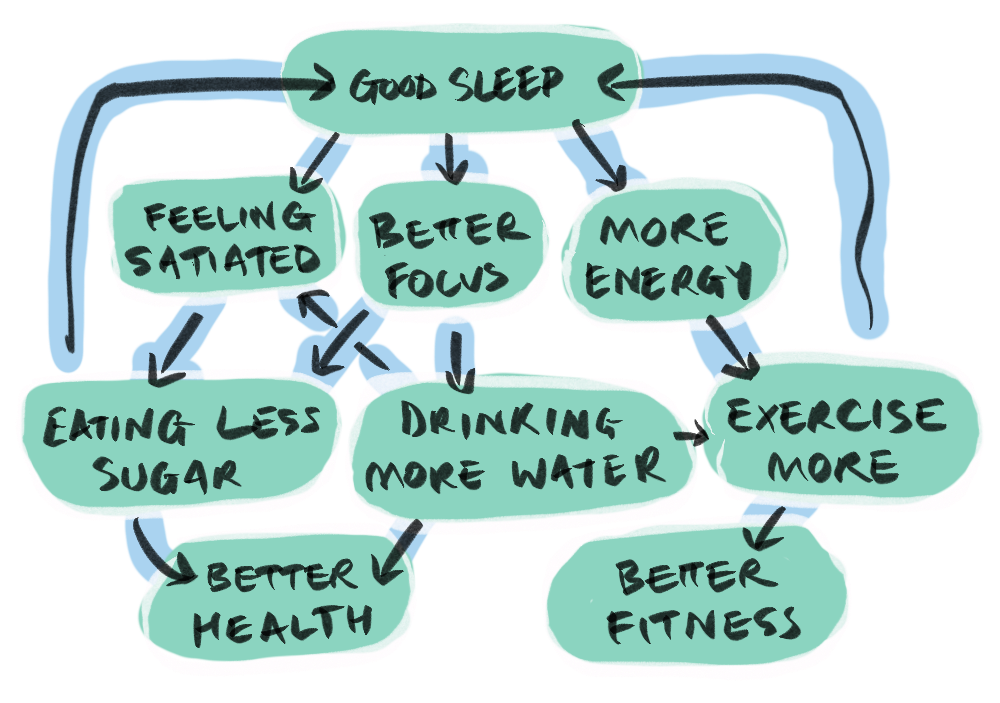
The Specifics
- Feel hungry once a day (catabolism). Feel full once a day (anabolism): a simple rule that doesn't have the friction of meticulous monitoring
- Fast 7pm—11am: allows for a period of catabolism, clears out system, not eating before bed helps sleep.
- No sugar: avoids getting out of balance, makes healthier food tastier
- Hypertrophy training: during an anabolic phase (with nutritious food) is the most efficient way of building muscle.
- Simplicity, consistency and balance: help to avoid failures of will-power and eliminate the need to artificially drive motivation.
Even More Specifics
I'm doing 2 runs (~5km) and 2 climbs per week, and 3 days of strength training; biceps (dumbbell curls, chin-ups), triceps (skull crushers, dips, press-ups), shoulders (side lifts). I'm skipping leg day indefinitely.
While exercise isn't the most effective way to lose weight, for me, I need to work out for my rock-climbing goals, but there's also a good reason why everyone benefits from exercise.

Earlier we said that working-out becomes efficient, well that's not actually entirely accurate, it’s more that we evolved to exercise a lot more than we do today, so our bodies can exercise very efficiently, without burning much energy—this is your body's norm. It's actually the sedentary lifestyle that your body adapts to, finding ways to burn calories when you're not doing anything. This can come in the form of overreacting to niggles, inflammation and auto-immune response, giving you restless leg syndrome when you're trying to sleep, night sweats, higher blood pressure, increased heart rate, nervous shakiness, embarrassed flushing—loads of wonderful calorie-burning mechanisms that require no exercise and hit us when we least want them to. Overall these lead us to be more anxious, sore and tired.
As well as the benefits for strength and endurance, working out is actually about quality of life and longevity, making our days less stressed and our body less inflamed, therefore avoiding physical or mental pathologies that cause physical and mental decline, and ultimately premature death. But, if that's not a good enough reason: you also can't get jacked without exercising!
Zero-sum games can make returning to old habits seem inevitable. But, by finding non-zero-sum fitness games, we might be able to tip the scales... This has been a useful realisation for me, and hopefully it can help you with your health and fitness too. If you'd like more detail about my training and diet this year, I have spreadsheets and all sorts to share... of course the proof will be in pudding, or lack there of, by the time next year rolls around. For now, here's to setting things in motion.
"an object in motion tends to stay in motion, an object at rest tends to stay at rest"—Newton's first law
Please let me know if you like this sort of more personal content, I realise it's a bit different, feel free to share your own training tips or goals in the comments.